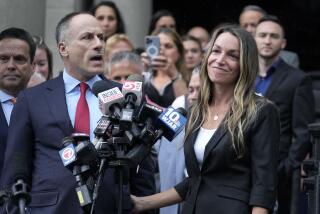Williams Trial Is Off--Then It’s Back On : Mistrial Declared by Judge in Case Who Then Reverses Himself
- Share via
NEW ORLEANS — A state judge declared a mistrial Tuesday in the point-shaving case against former Tulane University star basketball player John (Hot Rod) Williams, but reversed himself after meeting privately with lawyers for four hours.
At the close of 13 1/2 hours of Tuesday’s session, Judge Alvin Oser of Orleans Parish Criminal District Court explained the complicated legal strategy involved in the reversal.
If defense attorney Michael Green objected to the order for a mistrial and Oser were upheld by an appeals court, then Williams could be tried again. If Green accepted the mistrial, then Williams would also be tried again.
But Green refused to take either position, meaning the trial will proceed today. However, Green reserved the right to appeal, if Williams is convicted, on the basis of the material that produced Oser’s mistrial order.
It was about 5 p.m. CDT when Oser proclaimed a mistrial because prosecutors had failed to tell the court about a tape recording by one of Williams’ teammates.
Oser stopped the trial after testimony revealed that Jon Johnson, a forward who was granted immunity in the case, had recorded a statement but the district attorney’s office did not tell the court about it.
Oser asked Assistant District Attorney Eric Dubelier if there was such a tape. Dubelier said yes.
“You didn’t bring it to this court?” the judge asked. “Mr. Dubelier, you just caused a mistrial.”
Oser called lawyers for both sides into his chambers. It was expected that Green would ask that the case be dismissed because of prosecutorial misconduct. The mistrial would have meant that if the state chose to do it all over again they would have had to wait until next month’s jury pool is called. The current pool is considered tainted by exposure to this trial.
During the trial itself, Gary Kranz, a student, described a meeting at his off-campus apartment attended by Williams and other players to discuss plans for shaving points against Southern Mississippi on Feb. 2.
“John Williams told me they had broken into his car and stolen his radio and he needed money. He said his house had burned down and Tulane really didn’t give a damn and he needed money,” Kranz said.
Kranz, described in the indictments and by two prior witnesses as the primary organizer of the scheme, characterized himself as a reluctant go-between. He said he knew forwards Clyde Eads and Johnson and was able to introduce them to David Rothenberg and Mark Olensky, two students who are also testifying for the prosecution under plea bargains.
It was Rothenberg who urged the point shaving scheme, he said.
Williams, 6-10, faces three counts of conspiring to fix games and two counts of sports bribery. The charges carry a maximum penalty of 17 years in prison and $35,000 in fines.
Three members of the team are testifying for the prosecution--Eads and Johnson under grants of immunity and little-used point guard Bobby Thompson in a plea bargain.
Point guard David Dominique is scheduled for trial later.
The scandal led to Tulane’s dropping men’s basketball.
More to Read
Go beyond the scoreboard
Get the latest on L.A.'s teams in the daily Sports Report newsletter.
You may occasionally receive promotional content from the Los Angeles Times.









